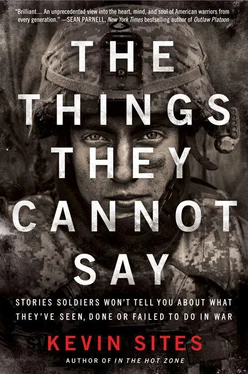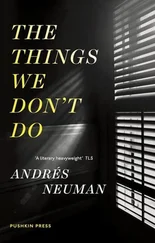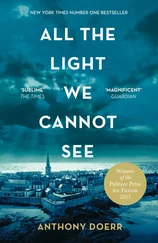Ayala walked up to inspect the blast site. What was left was a crater thirty to thirty-five feet in circumference and at least twenty feet deep. There were no fragments left, no evidence the artillery shells ever existed, but the violent force had exposed a patch of potatoes on the left, onions on the right, and the elephant grass behind the explosion had been mowed flat.
I snapped a photograph of Ayala, doing what he later will call his Captain Morgan pose, one foot resting slightly higher than the other on the crust of the hole. In this picture he’s smiling, but not all his days in Iraq have been as good as this one, nor will many of those remaining.
Ayala wanted to be a soldier since he was six after watching American soldiers on TV during the 1991 Gulf War. For the adopted kid from East Texas, the soldiers seemed an unstoppable force, rolling through the desert in their Abramses and Bradleys, wearing the distinctive “chocolate chip” camouflage and striking fear in the hearts of the Iraqi invaders while signaling hope for the Kuwaitis held captive in their own country.
“Even though I was so young I knew I wanted to do what they were doing,” Ayala tells me by telephone from his base at Fort Campbell near Clarksville, Tennessee, headquarters of the 101st Airborne Division.
It didn’t seem quite so glamorous thirteen years later, when as a U.S. soldier himself, he was blown off a rooftop by an insurgent bomb left inside a water barrel. At the time, Ayala and another soldier were doing overwatch, assuming an elevated position, this time on the roof of a house, and providing covering fire if needed for soldiers on the ground on patrol. When the bomb exploded, his first thought was that they had been mistaken for insurgents and rocketed by their own Apache helicopters.
“I was knocked out for a couple of minutes. My buddy shook me and said we just got hit with an IED. We were covered by rubble and I caught two pieces of shrapnel in the shoulder. I was obviously pissed off for a good while after that.” Those who saw what happened were surprised they weren’t both killed.
His commander tried to call in a medevac, but Ayala waved him off, thinking the chopper would become a target. Later in the day, his unit captured what they thought were the two insurgents who had placed the bomb in the barrel and manually detonated it from another rooftop across the street. Despite his injuries, Ayala says he didn’t take it out on the captives; he was relieved just to able to see their faces, rather than being on the receiving end of their infuriating invisible guerrilla tactics.
“I made them sit down but I wasn’t kicking them in the face. I’m sure their zip ties were a little too tight, but I wasn’t going to beat them up. I also wasn’t going to make them any more comfortable than Geneva Convention required,” says Ayala dryly.
While Ayala earned a Purple Heart for the rooftop explosion, it was an incident two weeks earlier that had begun his true initiation into what kind of bloody carnage the insurgents were capable of inflicting on the world’s most powerful army.
It was October 31, 2005. Halloween. Ayala’s unit had just arrived in Iraq in the middle of the month. The standard procedure was to go on patrols with the unit they would be replacing until they were familiar with their area of operations. This night they’d be on their own for the first time. The mission was a route clearing, to make sure the roads leading into and out of the base were clear of roadside bombs. Three or four miles southwest of Baghdad they found one—or it found them.
“The truck that got hit was second in convoy,” Ayala says, recalling the incident. “I was out in front looking for wires and then heard a really loud blast. A cloud of smoke covered everything. I could see the front of our truck, but nothing behind it. I thought the whole convoy had been blown.”
Ayala ran into the smoke plume, finding behind it a Hieronymus Bosch–like scene of hellfire, anguish and destruction. As the smoke cleared it revealed mangled, smoldering metal and dead and dying comrades. The men were from Alpha Company, same as Ayala’s, but a different platoon. The first man Ayala saw was a private missing a leg at midthigh and had been spurting bright red blood from his femoral artery, a bleeding emergency that could end in death within just four minutes. A medic had already applied a tourniquet, so Ayala began a head-to-toe check for secondary injuries, examining the private for contusions, hidden punctures, broken bones, anything that could further compromise his chances of survival. Ayala had so much adrenaline pumping he thought his hands might have been shaking had he not needed them to help the soldier. While the private seemed stable for the moment, the condition wouldn’t last. He would die from internal injuries while waiting to be evacuated.
Nearby, another private, the turret gunner of the Humvee that took the full blast of the roadside bomb, was already dead, and a first sergeant would die of his wounds while in the medevac helicopter heading for a CSH, or combat support hospital. But the casualty that affected Ayala the most is actually someone he knew, a specialist from the same part of East Texas where he grew up. The soldier had both of his legs blown off by the explosion. By the time Ayala reached him, the medic had already sedated the soldier with morphine.
“There wasn’t much I could do,” says Ayala. “I just held his hand and reassured him we got the birds on the way.” The soldier, Ayala would learn later, died from his injuries. Just two weeks into his Iraq tour and Ayala had already had his first combat baptism by blood and fire. He thought that if it had been a firefight it would’ve been okay, but this was different. They were fighting an enemy who wreaked deadly havoc without being seen. How could you fight someone like that? Ayala didn’t sleep that night.
“I just sat in my bunk,” he says, replaying the aftermath of the attack. “I thought to myself, It will be a miracle if the rest of us make it out of this [the war] intact. I was worried that it was all going to be like this.”
He was anxious and jumpy as the weeks went on, every time he went out on patrol.
“I just had to suck it up and do what I was doing. IEDs and small-arms fire kept me on my toes.”
What increased Ayala’s anxiety was the fact that aside from the other soldiers in his unit, there were few people he felt he could talk to about what he had already seen in Iraq. Neither his girlfriend nor his brother, a Marine at that time, seemed to understand when he tried to explain what was going on inside his head. And he didn’t want to worry his parents by sharing details about how members of his own company were already being killed in the first month of his deployment.
Christine McDaniels wasn’t ready to be a mother. She was young, just seventeen and still in high school. When her son, Michael, was born, she did what she thought was right for everyone involved. She immediately gave him up for adoption. Bob and Pam Ayala were told that it wasn’t likely they’d be able to have children of their own, so they were eager to adopt. Michael would be their first. They would eventually adopt four children as well as having one boy of their own. Bob was a successful contemporary Christian music singer/songwriter who had lost his eyesight to retinitis pigmentosa when he was just twenty years old. Despite his handicap, he made a solid living touring churches and revivals around the country and appearing on albums for the rapture-influenced Christian music band Last Days Ministries. Michael Ayala was brought up as an Evangelical Christian, being homeschooled, marching in Christian pro-life rallies with his family and even accompanying his adopted father on guitar during some of the worship services. But since Bob was often on the road, Ayala grew closer to his adopted mother.
Читать дальше












